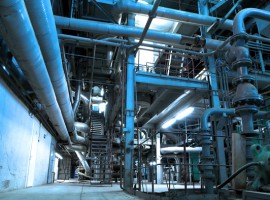Features / In Review


Egypt’s Gas Prices: The Entire Story
Gas pricing has been a recurring issue for the current and previous governments alike, and it remains without any apparent solution. The current government has changed the previous gas pricing equation – created by former Minister of Petroleum Sameh Fahmy– to allow gas prices to vary based on the nature of the drilling area and the cost of drilling; these amendments would only affect new and exploratory wells.
New Technologies
The pace of change in the oil and gas industry has been remarkable. Rapid industrialization over the past two decades has increased consumption of oil and gas, while technology has made meeting that demand possible. The expanding world population and chang- ing lifestyles means that the pressure to increase gas and oil production will never end.
The Latest on Fracking
Hydraulic Fracturing, more commonly referred to as fracking, has now gone international. The USA has been fracking for decades, but now Egypt, South Africa, the United Kingdom, China and Mexico are exploring the previously difficult to recover gas and oil reserves.
Russia, Ukraine, the EU and Gas: Will it Ever End?
Russia and Ukraine have a long history of disputes revolving around natural gas since Ukraine’s independence in 1992. In the last ten years the world witnessed three fallouts. The most recent of these came with a political background that proved neither simple, nor easily resolved. The current economic sanctions on Russia, which were imposed as a reaction to the political turmoil in Ukraine, affected the gas industry in numerous ways. While Russia is conquering new markets in China, Europe is feverishly diversifying its energy market.
Can Subsidy Cuts Curb the Energy Black Market?
“In every country in the world there is a black market,” says Sherif El-Diwany, Executive Director of the Egyptian Center for Economic Studies. “But ours is huge and that’s what makes it so damaging for the economy.” An energy market distorted by subsidies provides an environment that is ripe for shortages and exploitation of black market profits. In early July, the Egyptian government announced a range of drastic cuts to energy subsidies. Subsidized gasoline and diesel fuel prices rose by as much as 78%. Electricity subsidies are to be completely phased out over a five-year period, with prices set in rise by up to 56% in some pricing tiers in the short-term. Natural gas subsidies to several industries are being slashed.
The Growing Threats to Security in Egypt’s Oil and Gas Sector
From militant bombings to organized crime and isolated events of theft, oil and gas infrastructure in the remote areas of Sinai and the Western Desert have always been vulnerable to gaps in security. In the midst of severe energy shortages and national and regional political tension—industry experts and officials express concern over the growing threat.
Pemex – Mexico Model: A Multi-beneficial Solution to Problems Facing the Egyptian Petroleum Sector
In 2008, PICO started to explore new business opportunities in countries other than Egypt, thinking out of the box; PICO then approached Pemex in Mexico for the following reasons
Overview of Egypt’s Oil Refineries
Egypt is Africa’s second largest oil refining country and holds 23% of the continent’s total, domestically produced, crude oil. Egypt’s market is comprised of nine refineries—all operated by Egyptian General Petroleum Corporation (EGPC) with the exception of the privately owned, MIDOR Refinery in Alexandria. The Wall Street Journal reported in 2013 that, “Egypt will spend $18 billion over coming years to build new refineries and modify existing plants in a move to increase its annual fuel output.” Most of the refineries are located in Cairo, Alexandria, or Suez.



